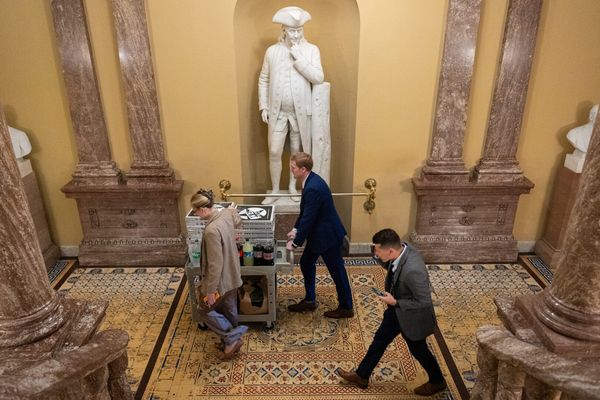BOISE, Idaho — A Jan. 29, 2015, public hearing at the Idaho Capitol seemed like a turning point for LGBTQ rights in the state.
After a decade of ignoring proposals to include protections for gay and transgender people in the Idaho Human Rights Act, Republican leaders agreed to host a hearing on the issue.
Public testimony lasted three days and most speakers testified in support of the bill. The legislative committee hearing followed rallies and Statehouse demonstrations by activists who supported adding the words “sexual orientation” and “gender identity” to the law that bars discrimination based on race, religion and sex.
But lawmakers rejected the proposal on a party-line vote.
“It was perfunctory,” said Cole LaFavour, Idaho’s first openly gay lawmaker, who served two terms as a Democrat in the Idaho House and two in the Senate.
Before the 2015 hearing, Idaho conservatives sought to “ignore” LGBTQ issues, LaFavour told the Idaho Statesman by phone. Lawmakers disregarded several proposals to update the Human Rights Act — which still does not include LGBTQ protections — and the 2006 constitutional ban on same-sex marriage didn’t explicitly name gay couples.
“There were so many ways they could ignore us and continue to pretend we didn’t exist,” LaFavour said.
That’s changed in recent years. Idaho Republicans have gone on the offensive against LGBTQ rights, enacting laws that strip transgender people of their ability to participate in sports and alter their birth certificates.
LaFavour credits partisan politics for the shift from apathy to animosity. In 2020, Idaho GOP legislators joined a wave of anti-transgender lawmaking in conservative-led states across the country. Experts say LGBTQ issues are effective campaign fodder, and after the U.S. Supreme Court settled the same-sex marriage debate in 2015, conservative lawmakers — with the help of anti-LGBTQ interest groups — turned to policies targeting transgender people.
“They want to have some sort of scary entity that they’re going to save their voters from,” LaFavour said. “Gay and transgender people have become that.”
Shifting views on gay rights
After Massachusetts in 2004 became the first state to legalize same-sex marriage, Idaho updated its constitution to say the state would only recognize marriage between a man and a woman.
Many GOP lawmakers at the time — including Gov. Brad Little, back then Senate majority caucus chair — resisted the same-sex marriage amendment in 2004 and 2005. By 2006, Little said that he couldn’t vote against the popular opinion of his district and needed to support the ban, the Statesman reported at the time.
“When you do that, you better have a pretty good reason,” Little had said.
Nearly two-thirds of Idaho voters approved the constitutional amendment banning same-sex marriage. Many other states passed similar amendments, and today 35 states, including Idaho, still ban same-sex marriage in their constitutions or state law, Stateline recently reported.
But public opinion shifted in subsequent years. One of the Idaho Legislature’s leading gay rights advocates was a North Idaho Republican, Joe Stegner of Lewiston. By 2015 — the year the U.S. Supreme Court declared gay couples had the right to marry — more than half of U.S. adults supported same-sex marriage, according to a Pew Research Center survey at the time.
That year, Idaho House Speaker Scott Bedke, R-Oakley, urged lawmakers to consider the Human Rights Act amendment to protect LGBTQ residents from discrimination. Then-Gov. Butch Otter, also a Republican, said he would sign the bill if it passed.
“It’s time,” Bedke said in 2015.
Republicans in the House committee that struck down the bill said its lack of definitions for the additional words posed risks to the religious community. The law could have forced a person to violate their religious beliefs, they said.
“There is a tension between someone’s rights based on their sexual orientation and gender identity, and another’s rights based on their sincerely held religious beliefs,” said Rep. Brent Crane, R-Nampa, the Spokesman-Review reported at the time. “I do not believe that” the Human Rights Act amendment, “as it’s written, will solve that tension.”
The Human Rights Act still hasn’t been updated. This year, Rep. John McCrostie, D-Garden City, currently the only openly gay Idaho lawmaker, introduced another bill to update the law, “knowing that it’s not going to get a full public hearing,” he told the Statesman in January.
Meanwhile, antagonism toward the LGBTQ community has intensified. Last week’s campaign against the Boise Pride Festival is the latest example.
Multiple sponsors pulled their support after conservative activists and Idaho GOP Chairwoman Dorothy Moon condemned the event for featuring a kids drag show. Boise Pride canceled the show following media coverage and online scrutiny.
“The kids who were going to perform have the enthusiastic support of their community and support and consent of their parents,” Boise Pride organizers said in a statement. “We support the kids 1,000% and their choice to be themselves, stand their truth and express themselves.”
GOP elected officials also objected to the kids drag show. Bedke, who’s running for lieutenant governor, told the Statesman that he respects “all Idahoans” and supports “their individual rights and freedoms.”
“However, a kids’ drag show crosses the line and is in no way reflective of our shared Idaho values, which I will fight to defend as your next lieutenant governor,” Bedke said by email.
House Assistant Majority Leader Jason Monks, R-Meridian, urged Boise Mayor Lauren McLean and City Council members to withdraw Boise’s taxpayer-funded sponsorship for the Pride festival.
“I object to any private organization that receives taxpayer funds and uses said funds to support social causes, especially those that are so offensive to the majority of Idahoans,” Monks wrote in a letter, which he posted on social media.
Public opinion inconclusive
It’s not evident that the majority of Idahoans are offended by LGBTQ causes.
Public opinion polling is limited in Idaho. There’s little incentive for the expensive process in a small state that consistently votes for one party in national elections, said Benjamin Larsen, Ph.D., a research scholar at Boise State University’s Idaho Policy Institute, a nonpartisan group that provides policy research to public officials.
In 2014, 49% of Idaho residents said they support same-sex marriage, according to a Pew Research Center survey. That’s compared to 39% who said they oppose it and 12% who said they don’t know.
Of those who said they oppose marriage equality, three in four said religion is “very important” in their lives, and 4% said religion is not at all important.
Last year, a majority of U.S. Republicans — 55% — supported same-sex marriage, up from 28% a decade earlier, according to a 2021 Gallup poll.
More recently, a June Gallup poll found support for same-sex marriage nationally reached 71%. Pew Research Center in June found nearly 2 in 3 Americans also supported protecting transgender people from discrimination.
But on other legal issues related to transgender people, Americans are sharply divided along partisan lines. The Pew survey found that 85% of Republicans believed that laws should require transgender athletes to compete in sports that match the sex they were assigned at birth. Just 37% of Democrats agreed.
Idaho Republicans in 2020 enacted a law that barred transgender women and girls from competing in female sports. It now faces a court challenge.
Fewer Republicans (72%) said they believe it should be illegal to provide gender-affirming health care to transgender children. The Idaho House pushed a bill this year that would have made such health care illegal, but the Senate declined to consider it.
While it’s unclear where the majority of Idahoans stand on LGBTQ rights, “morality politics,” like abortion and LGBTQ policies, make for “very good campaign issues,” Larsen said.
Morality politics “can be easily put into a black and white dichotomy,” said Larsen, whose research focuses on LGBTQ issues and legislative behavior.
“It’s very easy to explain very quickly,” Larsen told the Statesman by phone. “It feeds into people’s preconceived notions about how things should be, versus trying to campaign on something like a new education program that has a lot of parts and is very complicated to implement.”
What’s an election worth?
Policies targeting transgender rights that surface in Idaho are informed by out-of-state interest groups that support conservative values, Larsen said.
“It’s the same organizations that are also spreading information on issues like critical race theory or book banning,” Larsen said.
Idaho is among dozens of states that enacted or proposed legislation banning transgender women and girls from participating in female sports. In 2020, Idaho also passed a law blocking transgender people from changing the gender on their birth certificates.
Rep. Barbara Ehardt, R-Idaho Falls, proposed the sports bill, and Rep. Julianne Young, R-Blackfoot, floated the birth certificate legislation.
Ehardt last year said the sports bill was her idea — spurred by a Connecticut track meet in which two transgender girls won — but she enlisted the Alliance Defending Freedom, an Arizona-based advocacy group that lobbies against LGBTQ rights, to help craft the bill, the Idaho Capital Sun reported.
The Associated Press reported last year that nearly every sponsor of more than 20 bills banning transgender girls from competing on girls sports teams could not cite a problem in their state or region that led to the proposal.
Early in the 2020 legislative session, Little said the sports and birth certificate bills addressed issues happening in other states, not Idaho.
“I don’t think we ought to be sending signals that we’re intolerant in Idaho,” Little said at the time.
The Idaho attorney general’s office warned that each bill would attract costly lawsuits. Major Idaho employers, including Chobani, Clif Bar, HP and Micron, said the anti-transgender bills would hurt their recruitment efforts. But fewer than half a dozen Republicans opposed each proposal. And Little signed both into law.
This year, a judge ordered the state to pay more than $320,000 in legal fees after it failed to defend the birth certificate bill. A Boise State University student’s challenge of the transgender sports bill is ongoing.
Little’s spokesperson did not respond when asked to explain the governor’s current stance on LGBTQ rights.
It’s unclear whether support for transgender rights among conservatives will grow in the coming years like marriage equality did. A key factor is the ability of LGBTQ communities to continue organizing, which propelled gay rights into the American political system in the 1950s, Larsen said.
The U.S. Supreme Court backed gay rights in Lawrence v. Texas, a 2003 case in which justices declared laws criminalizing same-sex relationships unconstitutional. If the Supreme Court — which has a conservative majority and this year abandoned federal protections for abortion — reverses its decision in Lawrence v. Texas, it would make gay and transgender rights “a lot less certain,” Larsen said.
But the most important factor in political leaders’ support for LGBTQ rights is whether they know someone who is gay or transgender, Larsen said. Republicans have transgender children, too, LaFavour said, and they also will be affected by anti-LGBTQ policies.
“What is worth sacrificing what you believe in, sacrificing what you know is right?” LaFavour said. “Is your seat really worth that? Or is there a time in history when you stand up and you say, ‘This is wrong’?”
———







